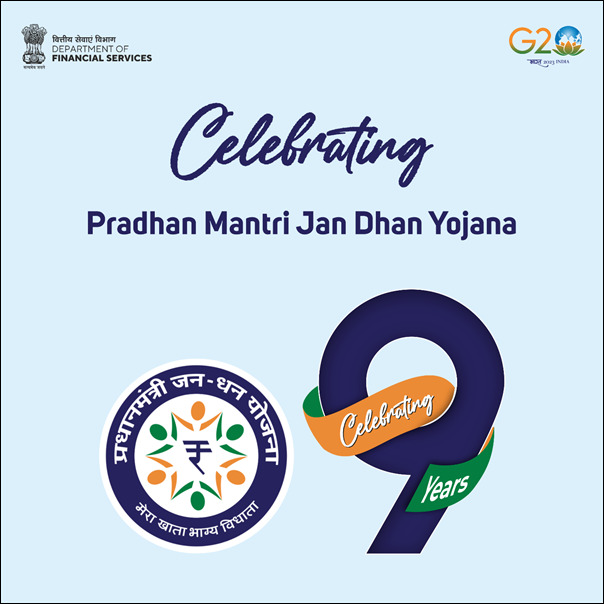Pradhan Mantri Jan Dhan Yojana (PMJDY) completes nine years
Today marks the culmination of nine years of the Pradhan Mantri Jan Dhan Yojana (PMJDY), the National Mission for Financial Inclusion.
In his Independence Day speech on August 15, 2014, Prime Minister Shri Narendra Modi introduced the PMJDY. The Prime Minister had termed the event as a festival to celebrate the release of the impoverished from a vicious cycle when the scheme was introduced on August 28, 2014.
The Union Finance Minister, Smt Nirmala Sitharaman, wrote in a message commemorating the ninth anniversary of PMJDY, "The nine years of PMJDY-led interventions and digital transformation have changed financial inclusion in India. It is encouraging to learn that the establishment of Jan Dhan Accounts has allowed more than 50 crore people to access the official banking system. About 55.5% of these accounts are held by women, and 67% of them were started in rural or semi-urban areas. These accounts have received deposits totaling more than 2 lakh crore. Additionally, around 34 crore RuPay cards—which come with a $25,000 accident insurance policy—have been free of charge-supplied to these accounts.
On this occasion, Dr. Bhagwat Kisanrao Karad, the Union Minister of State for Finance, also shared his ideas about PMJDY. By including the socially excluded in formal banking, he claimed, "PMJDY programme has reduced financial untouchability. The benefits of the programme are extensive and have a multiplier effect on the economy through facilitating access to credit availability, providing insurance and pension coverage, and raising financial literacy among vulnerable groups in society. Furthermore, the seamless transfer of government benefits into the accounts of the average person has been made possible by the Jan Dhan-Aadhaar-Mobile (JAM) architecture. A focal point for people-centered projects like DBT, PMJDY accounts have facilitated the inclusive growth of all societal segments, particularly the impoverished.
Impact of PMJDY
The cornerstone of people-centered economic efforts has been PMJDY. All of these measures, including direct benefit payments, COVID-19 financial aid, PM-KISAN, improved wages under MGNREGA, and life and health insurance coverage, start with the provision of bank accounts for every adult, which PMJDY is almost done with.
A PMJDY account was one of every two new accounts registered between March 2014 and March 2020. More than 20 crore women's PMJDY accounts received cash assistance of Rs 500 per month for three months through DBT within 10 days of the statewide lockdown.
We have seen firsthand how Direct Benefit Transfers (DBTs) have empowered and given financial security to the most vulnerable members of society during the COVID-19 pandemic with astonishing speed and ease. The fact that DBTs through PMJDY accounts have made sure every rupee reaches its designated beneficiary and stopped systematic leakage is a crucial factor.
Almost every adult in India now has access to financial services thanks to PMJDY, which has also improved India's financial infrastructure.
The Road Ahead
Make an effort to guarantee that PMJDY account holders are covered by microinsurance programmes. It will be attempted to cover eligible PMJDY accountholders under PMJJBY and PMSBY. The same has already been stated to banks.
Creation of acceptance infrastructure across India for the purpose of encouraging the use of digital payments, particularly the use of RuPay debit cards, among PMJDY accountholders.
Facilitating account holders' access to microcredit and microinvestments such as flexi-recurring deposits, etc.


